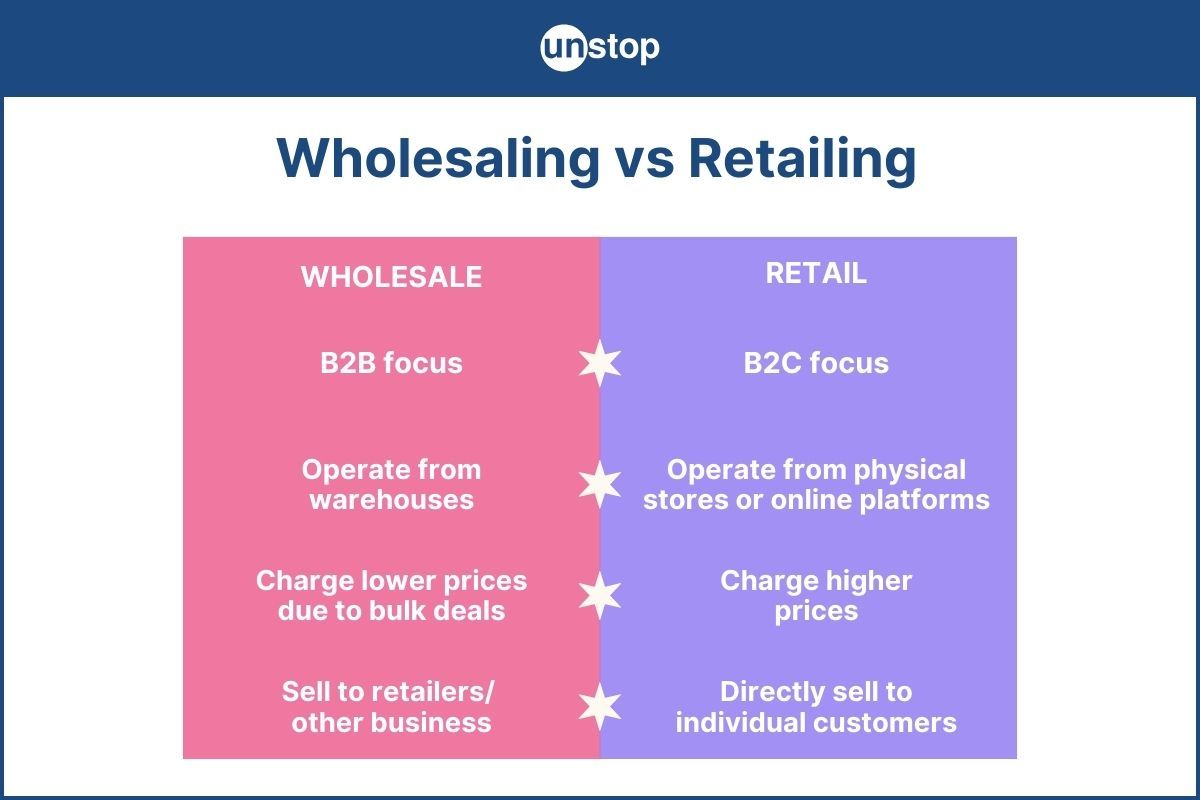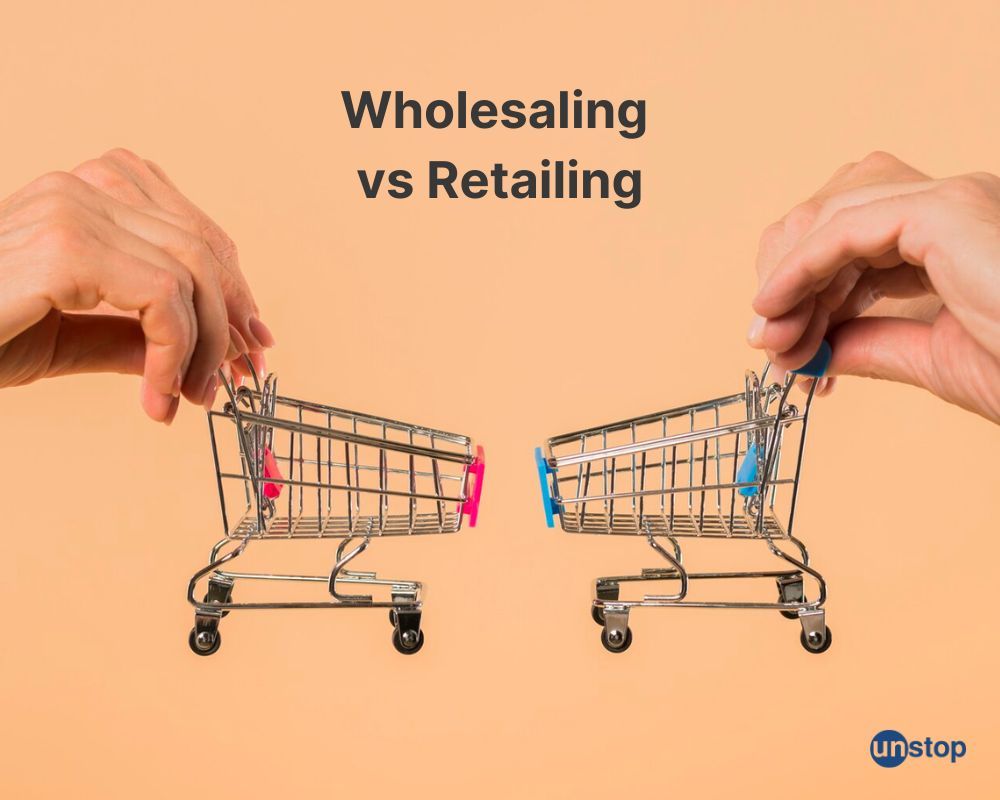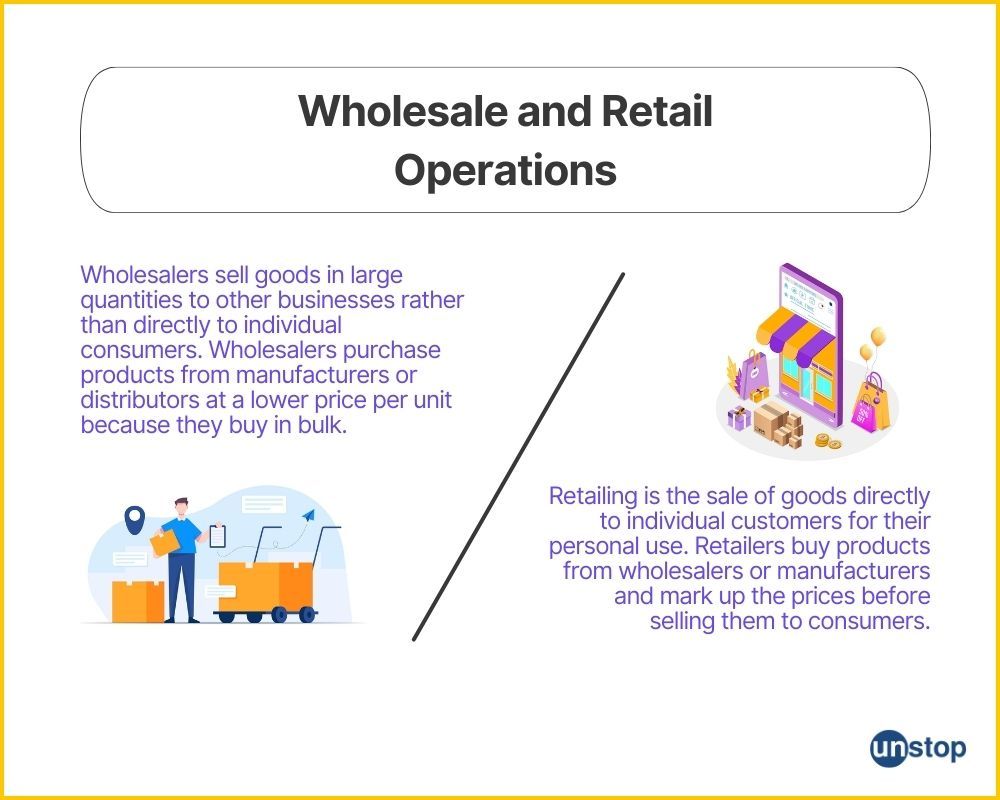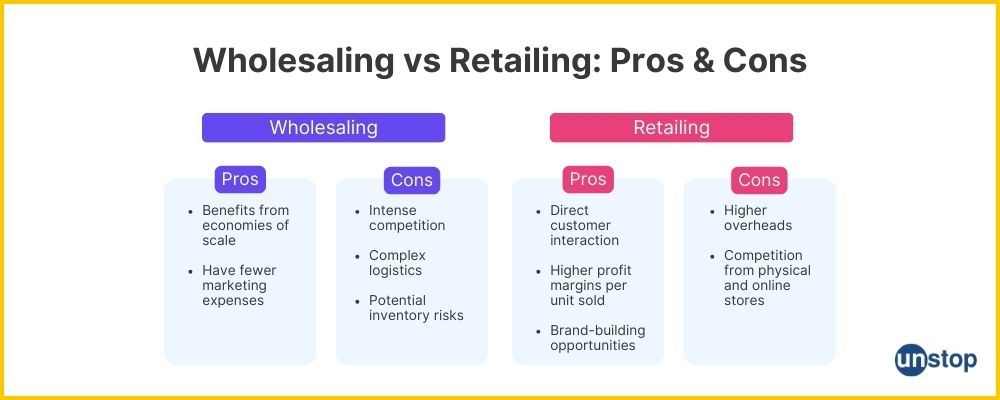- Key Difference Between Wholesale And Retail
- Understanding Wholesale and Retail
- Wholesale vs. Retail: Benefits & Challenges
- Wholesale vs Retail: How are They Different?
- Wholesale vs Retail Trade: Distribution, Price and Profit
- Wholesale vs Retail: How are They Similar?
- Choosing the Right Path: Wholesaling or Retailing?
- Frequently Asked Questions (FAQs)
Top 9 Difference Between Wholesale And Retail Explained In Detail

To navigate the dynamic world of commerce, it is crucial to grasp the difference between wholesale and retail. This understanding serves as a foundation for entrepreneurs, business owners, and consumers alike. The wholesale industry focuses on selling goods in large quantities to retailers, who then sell them to individual customers. On the other hand, retail businesses cater directly to end consumers by offering products in smaller quantities.
By exploring how these industries operate and their interdependent relationship, we can gain valuable insights into the purpose and impact of wholesale and retail on the economy.
Key Difference Between Wholesale And Retail

The key difference between wholesale and retail lies in the target audience. Wholesale focuses on selling large quantities of goods to businesses, while retail targets individual customers who purchase items for personal use. Here's a breakdown:
-
Wholesale: Sells products in bulk quantities to other businesses.
-
Retail: Sells products in smaller quantities suitable for individual consumption.
For example, let's consider a clothing manufacturer. They may sell their products in bulk to department stores or boutique owners at wholesale prices. These businesses will then display and sell those clothes individually at higher prices directly to customers.
Thus, the difference between wholesale and retail is selling to businesses (wholesale) vs. selling to consumers (retail).
Understanding Wholesale and Retail

Wholesale and retail are two different ways of selling products, each catering to a specific type of customer. Before we study the difference between wholesale and retail in detail, let’s first understand these concepts:
Wholesale
Definition: A wholesale business is one that sells goods in large quantities to other businesses rather than directly to individual consumers. These businesses purchase products from manufacturers or distributors at a lower price per unit because they buy in bulk. The primary purpose of wholesale is to distribute products to retailers or other intermediaries who will then sell them to the end consumers.
Retail
Definition: Retailing refers to the sale of goods directly to individual customers for their personal use. When you go shopping at your favorite store or browse online marketplaces like Amazon or eBay, you are engaging in retail transactions. Retailers buy products from wholesalers or manufacturers and mark up the prices before selling them to consumers.
The role of intermediaries in wholesale and retail
Though there is a notable difference between wholesale and retail, both involve intermediaries who play crucial roles in getting products from manufacturers to end consumers:
-
Wholesalers: These middlemen purchase goods from manufacturers in large volumes and distribute them further down the supply chain.
-
Distributors: They act as intermediaries between manufacturers and retailers, ensuring that products reach their intended destinations.
-
Retailers: They sell products directly to consumers through physical stores or online platforms.
Intermediaries help streamline the distribution process, making it easier for manufacturers to reach a wider customer base. They also provide additional services such as warehousing, transportation, and marketing support.
Wholesale vs. Retail: Benefits & Challenges

Certain distinct advantages and challenges in the business models contribute to the difference between wholesale and retail. Let's explore the benefits and challenges faced by both wholesalers and retailers:
Advantages for Wholesalers
Wholesalers enjoy several advantages that contribute to their success in the market. Firstly, wholesalers deal with larger sales volumes compared to retailers. This allows them to benefit from economies of scale, which means they can purchase goods in bulk at lower prices. By buying in large quantities, wholesalers can negotiate better deals with suppliers and manufacturers.
Moreover, wholesalers have fewer marketing expenses compared to retailers. They primarily focus on selling products to retailers rather than directly targeting end consumers. This eliminates the need for extensive advertising campaigns or maintaining a physical storefront, resulting in cost savings for wholesalers.
Challenges Faced by Wholesalers
While there are numerous advantages associated with being a wholesaler, there are also challenges involved in this business model. Intense competition within the wholesale industry poses a significant challenge for wholesalers seeking differentiation in the market. With numerous competitors offering similar products at competitive prices, it becomes crucial for wholesalers to find unique selling propositions to stand out from the crowd.
Wholesalers also face potential inventory risks. Since they purchase goods in bulk, there is a higher risk of being left with excess inventory if demand unexpectedly drops. Managing and forecasting inventory levels becomes essential to avoid financial losses.
Furthermore, wholesalers encounter complex logistics due to their involvement in the distribution process. They must coordinate the transportation of goods from manufacturers or suppliers to retailers efficiently. This involves managing fulfillment costs, ensuring timely deliveries, and handling any logistical issues that may arise.
Benefits for Retailers
Retailers reap unique benefits from their business model. One significant advantage is direct interaction with customers. Unlike wholesalers who sell to other businesses, retailers have the opportunity to build relationships with individual consumers. This allows them to understand customer preferences better and tailor their offerings accordingly.
Another benefit for retailers is higher profit margins per unit sold. Since they sell products directly to consumers at retail prices, they have more control over pricing strategies and can mark up the wholesale price significantly. This enables them to generate higher profits per sale compared to wholesalers.
Operating as a retailer provides brand-building opportunities that are not easily accessible to wholesalers. By establishing a physical store or an online presence, retailers can create brand awareness among consumers and cultivate brand loyalty through personalized experiences.
Difficulties Encountered by Retailers
While retailers enjoy certain benefits, they also face specific challenges within their business model. High operational costs are a significant concern for retailers, especially those operating physical stores. Expenses such as rent, utilities, and employee wages can put significant pressure on profit margins.
The rise of e-commerce has intensified competition for retailers. Online shopping offers convenience and competitive pricing options that traditional brick-and-mortar stores struggle to match. To remain competitive, retailers need to adapt to the digital landscape and invest in online platforms or omnichannel strategies.
Wholesale vs Retail: How Are They Different?
Wholesalers and retailers may sound similar, but they have some key differences that set them apart. Let's take a closer look at the difference between wholesale and retail:
| Criteria | Wholesaling | Retailing |
| Business Model | Wholesalers buy goods in bulk from manufacturers and sell them to retailers or other businesses. | Retailers buy goods from wholesalers or directly from manufacturers and sell them to individual consumers. |
| Customer Base | Wholesalers typically sell to other businesses, such as retailers, restaurants, or hotels. | Retailers sell directly to individual consumers. |
| Quantity Sold | Wholesalers sell large quantities of goods at a time. | Retailers sell smaller quantities of goods to individual consumers. |
| Pricing | Wholesalers usually offer lower prices per unit due to the large quantities they purchase. | Retailers often sell goods at higher prices to cover their overhead costs and make a profit. |
| Inventory Management | Wholesalers typically maintain large warehouses to store their inventory. | Retailers may have smaller storage spaces and frequently restock their inventory. |
| Marketing and Advertising | Wholesalers usually focus on marketing their products to retailers or businesses through trade shows, catalogs, or online platforms. | Retailers focus on marketing their products directly to consumers through advertising, promotions, and online or in-store displays. |
| Nature of Customer Service | Wholesalers primarily provide customer service to retailers or businesses, such as assisting with product selection or providing information on bulk pricing. | Retailers focus on providing customer service directly to individual consumers, such as assisting with product inquiries, processing returns, or offering personalized recommendations. |
| Product Variety | Wholesalers often offer a wider range of products to cater to the diverse needs of retailers and businesses. | Retailers may specialize in specific product categories or offer a curated selection of products based on consumer demand. |
| Order Size | Wholesalers typically receive large orders from retailers or businesses. | Retailers receive smaller orders from individual consumers. |
| Profit Margin | Wholesalers generally operate on lower profit margins compared to retailers. | Retailers have higher profit margins due to the higher prices |
Wholesale vs Retail Trade: Analyzing Distribution, Price and Profit Margins
To understand the difference between wholesale and retail, it's important to examine how distribution channels, price and profit margins are determined in each sector.
Profit Margins
Wholesalers make their profits by selling products in large quantities. They often offer discounted prices to retailers because they can purchase goods in bulk from manufacturers. This volume-based pricing strategy allows wholesalers to negotiate lower costs per unit, enabling them to make a profit when selling at a slightly higher price to retailers.
Wholesalers aim for high sales volumes rather than relying on substantial profit margins per unit sold because by selling large quantities, wholesalers can generate significant revenue even with lower profit margins. This approach also allows them to maintain a steady cash flow and build strong relationships with retailers.
Retailers sell products directly to consumers at higher prices. They determine their profit margins by adding markups to the wholesale prices they pay for goods. The markup is the difference between the cost of purchasing items from wholesalers and the final retail price charged to customers.
Retailers consider several factors when setting their profit margins, including market demand and competition levels. If there is high demand for a particular product with limited availability, retailers may increase their markup percentages to maximize profits. On the other hand, if competition is fierce or demand is low, they may need to keep their markup percentages lower to remain competitive in the market.
Distribution channels
In wholesaling, distribution channels are designed for efficient delivery to multiple retail locations. Wholesalers often operate large warehouses or distribution centers strategically located in various cities. This enables them to quickly distribute products to retailers across different regions.
Distribution in retail trade is tailored towards reaching consumers effectively. Retailers may have their own physical stores or operate online platforms where they showcase and sell their products directly to customers.
Price Differentials between Wholesale Purchase Costs and Final Retail Prices
The price differential between wholesale purchase costs and final retail prices can vary significantly depending on various factors such as product quality, competition levels, and market demand. While wholesalers aim for smaller profit margins per unit sold but larger overall sales volumes, retailers strive for higher profit margins per individual sale.
For example, let's consider a pair of sneakers. A wholesaler might purchase them from the manufacturer for ₹2000 per pair and sell them to retailers for ₹2400 per pair, making a profit of ₹400 per unit. The retailer, in turn, may add a markup of ₹1600 and sell the sneakers to consumers for ₹4000. This markup allows the retailer to cover their operating expenses, such as rent, utilities, and employee salaries while still making a profit.
It's important to note that these price differentials can vary across industries and products. Some items may have higher markups due to exclusivity or brand recognition, while others may have lower markups due to intense competition or low demand.
Wholesale vs Retail: How Are They Similar?
Wholesaling and retailing are two different ways of selling goods, each serving a unique purpose in the business world. While there are several differences between wholesale and retail, they do have one similarity.
Both wholesale and retail operations require effective inventory management.
Wholesalers need to maintain sufficient stock levels to meet the demands of their retail customers. They must anticipate market trends and ensure they have enough inventory on hand to fulfill orders promptly.
Similarly,retailers also need to manage their inventory carefully to meet customer demands while avoiding overstocking or understocking situations. They must strike a balance between having enough stock available for immediate sale without tying up excessive capital in unsold merchandise.
Choosing the Right Path: Wholesaling or Retailing?
Here are some factors that determine if businesses should opt for wholesaling or retailing:
-
Market Research and Identifying Target Customers: Before diving into either wholesaling or retailing, it's essential to conduct thorough market research. This will help you understand the demand for your products, identify potential customers, and determine the most effective distribution channels. By understanding your target audience, you can tailor your approach accordingly.
-
Financial Aspects: Another important factor in choosing between wholesale and retail is the financial aspect. You need to evaluate how much initial investment you're willing to make and the profit potential of each option. Wholesaling often requires a smaller upfront investment since you're selling in bulk quantities, while retailing may require more capital for inventory and storefront expenses.
-
Cash Flow Requirements: Cash flow is critical for any business's survival and growth. Consider whether you prefer steady cash flow from regular wholesale transactions or the potential for higher profits but potentially slower sales with retailing. Understanding how cash flows in each model will help you plan your finances effectively.
-
Personal Preferences, Skills, and Expertise: Your personal preferences, skills, and expertise play a significant role in determining which path suits you best. Wholesaling requires strong negotiation skills, networking abilities, and an understanding of supply chain logistics. On the other hand, retailing demands excellent customer service skills, visual merchandising capabilities, and an eye for trends.
Wholesaling may be a suitable option for those looking to distribute products on a larger scale or establish partnerships with various retailers. Retailing, on the other hand, allows businesses to engage directly with consumers and build brand loyalty.
Frequently Asked Questions (FAQs)
1. What are some common wholesale pricing strategies?
Wholesalers often employ various pricing strategies to maximize their profits while remaining competitive in the market. Some common approaches include cost-plus pricing (adding a predetermined markup percentage to cover expenses), volume-based discounts (offering lower prices for larger orders), seasonal promotions (discounts during specific times of the year), and negotiated contracts (tailoring prices based on individual agreements).
2. Is it possible to switch from wholesaling to retailing?
Yes, it is possible to transition from wholesaling to retailing. However, this shift requires careful planning and consideration of factors such as market demand, competition analysis, pricing strategies, distribution channels, and marketing efforts. It may also involve adapting your business model, establishing relationships with suppliers or manufacturers directly, and building a strong brand presence in the retail space.
3. What are the key challenges in retailing?
Retailing comes with its own set of challenges. Some common hurdles include intense competition from both brick-and-mortar stores and e-commerce platforms, managing inventory effectively to meet customer demands without overstocking or understocking products, maintaining competitive pricing strategies while considering profit margins, providing exceptional customer service experiences, and staying up-to-date with evolving consumer trends.
4. What are the advantages of wholesale purchasing?
Wholesale purchasing offers several advantages, such as lower prices per unit due to bulk buying, access to a wide range of products from different manufacturers, potential discounts based on order quantity, and opportunities for establishing long-term relationships with suppliers.
5. Are there any minimum order requirements when buying wholesale?
Minimum order requirements vary depending on the supplier or manufacturer. Some wholesalers may have minimum purchase quantities, while others may not impose such restrictions. It is advisable to inquire about minimum orders before making a purchase.
6. Can I buy wholesale products if I am not a retailer?
While wholesalers primarily serve retailers or businesses involved in resale activities, some wholesalers may also sell products to individuals or non-retail customers. However, it is essential to check with the specific wholesaler regarding their policies and eligibility criteria.
7. Are there any legal requirements for starting a wholesale business?
Legal requirements for starting a wholesale business may vary depending on the jurisdiction. It is advisable to consult local authorities or seek legal advice to understand licensing, permits, tax obligations, and other regulatory aspects associated with operating a wholesale business.
8. How can I determine if retailing or wholesaling is more suitable for my business?
Determining whether retailing or wholesaling is more suitable depends on various factors, such as the nature of your products, target market, distribution capabilities, and long-term goals. Conducting market research and analyzing your business needs can help you make an informed decision that aligns with your objectives.
Suggested Reads:
- Retail Pricing: Importance, Strategies, Examples & Tools
- Category Management 101: Process, Benefits, and Strategies
- What Is Retail & How Does It Work? Demystifying The Vital Component Of Economy
- Retail Management Decoded: Find Its Meaning, Importance, Benefits & Types
- Visual Merchandising: Definition, Types, And Examples
Alekhya Chakrabarty is a father, a doodler, a trivia buff, a sports fanatic and a lifelong student of marketing. Alekhya is the VP of Marketing & Growth at Unstop, the engagement and hiring platform which connects students and graduates with opportunities. He has over a decade and a half of experience in driving revenue and building brands with the likes of Nestle, HUL and ITC. He is an alumnus of IMT Ghaziabad and in his last stint he was leading the marketing function at Sunstone, a higher education startup. Alekhya has been recognised as a ‘Top Voice’ on LinkedIn for Digital Marketing & Brand Management. He runs a marketing podcast titled East India Marketing Company to drive conversations around growth, content, culture and commerce.
Login to continue reading
And access exclusive content, personalized recommendations, and career-boosting opportunities.
Subscribe
to our newsletter















Comments
Add comment